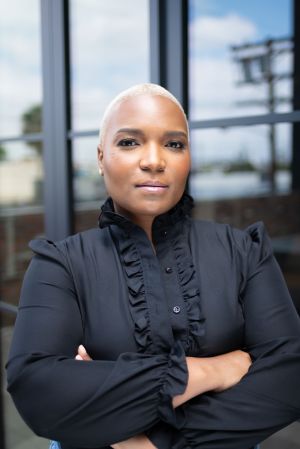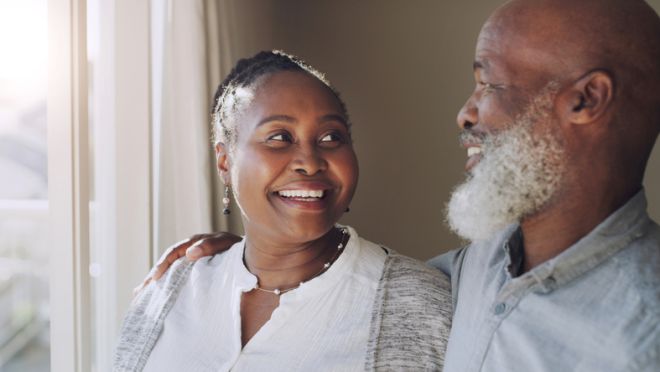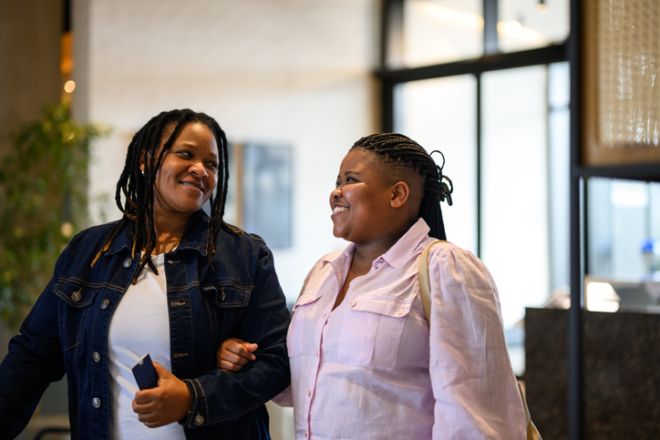'Grey's Anatomy' Producer Felicia Pride On Love After 40
‘Grey’s Anatomy’ & ‘Queen Sugar’ Writer & Director Felicia Pride On Love After 40: ‘Aging Is A Luxury, Not A Liability’ [Exclusive]
Felicia Pride redefines love in your 40s with her novella 'Come Close,' proving romance at midlife isn’t a comeback story but a continuation.
Share the post
Share this link via
Or copy link

For decades, Hollywood has offered women over 40 one narrow love narrative: the comeback. Think Angela Bassett in How Stella Got Her Groove Back. It’s the framing that says passion only returns after a tropical trip, a younger partner, or a dramatic shake-up. Later-in-life love is treated like a novelty, as though joy, intimacy, and desire expire after 35 and must be rekindled.
What happens when women stop being framed as comeback queens and instead are shown living fully in the layered, self-assured, and unapologetic love they’ve created?
RELATED CONTENT: Tia Mowry Is ‘Nervous’ But Ready To Get Back On The Dating Scene
That’s the shift writer, producer, and filmmaker Felicia Pride is helping to lead. Her new novella, Come Close: A Romance Novella, reframes romance at 40 as continuation rather than reclamation. The story follows Amaya Ellis, a filmmaker directing her first feature, who unexpectedly reconnects with a past love. It’s a second-chance romance, but one rooted in clarity, maturity, and possibility rather than nostalgia.
In a conversation with MadameNoire, Pride explained why this reframing matters.
Aging Is A Luxury, Not A Liability

Love MadameNoire? Get more! Join the MadameNoire Newsletter
We care about your data. See our privacy policy.
When asked why love after 40 is so often framed as “later in life” or a groove-back story, Pride pointed to something bigger than Hollywood tropes.
“I think we live in a very ageist society, and there’s a lot of fear around aging. At the same time, there’s a celebration of youth and nostalgia. The honest truth is aging is a luxury. We should all be so lucky to age.
“For women in particular, there is a lot of projection that we’re no longer desirable or have desires at a certain age. Sometimes we internalize that, and it impacts how we go about our dating lives. There are a lot of factors that have to do with various forms of discrimination. That’s what contributes to this narrative.”
Her point is clear: the “groove-back” trope isn’t harmless. It reflects — and reinforces — discrimination that casts older women as invisible.
Instead of viewing new relationships at 40 or 50 as shocking, Pride argues they should be treated as an ordinary (and ongoing) part of life.
“Most of us have had relationships throughout our lives. So the fact that we may have a new relationship after 40 or after 50 is not novel. It’s not a new thing.
“We should think of it as a continuation — that women of a certain age continue to be love interests, continue to have interests in love, continue to be objects of desire. Media is important because it can play a role in showing that continuation. It’s a normal part of life. It’s not something worthy of headlines. It just is.”
Amaya Ellis, the protagonist of Come Close, isn’t chasing youth or apologizing for desire. She is fully in her career, fully in her body, and open to love not as a reclamation, but as an extension of her wholeness.
The Strengths Of Love In Your 40s

Pride is candid about what makes love different — and stronger — now.
“I know myself so much more in my 40s, which really helps me to show up as my authentic self. That helps me attract suitors and partners who are attracted to that authentic self. I was doing a lot of performing in my 20s and parts of my 30s, figuring out who I was and letting other people tell me who I was.
“I also have a self-assuredness that allows me to enter relationships without feeling the need to bend or shrink to secure a partner. And I’ve solidified a life of my own. I’m not looking for someone to make me happy. I’m looking for someone who fits nicely into what I’ve already created, and vice versa.”
Her words cut to the core of why mid-life love can feel like a superpower: it’s rooted in authenticity, not performance.
She’s also honest about the contrast between how she dated then and now.
“I definitely dated from a place of desperation in my 20s and 30s. I felt like I was supposed to have a certain kind of life, which included a husband and children, before I even knew if that was something I wanted. I never stopped to ask myself if that was really what I desired.
“When you don’t have it, you start to feel shame and depression. I also had trauma around my relationship with my dad, so I was looking for his love in the love of men. As I got older, I was able to unpack those feelings and that trauma. I went to therapy and focused on myself, becoming full and healthy — mentally, emotionally, spiritually.
“Dating out of desperation had me making really bad choices. Painful choices. It was bad. But when I asked myself why I was making those choices, I was able to dig deep and do the work, which was really healthy for me.”
This is the shift younger generations need to hear: when love is rooted in desperation, it’s brittle. When it comes from abundance, it’s expansive.
RELATED CONTENT: Q-Tip Asks Twitter For Help Finding The Girl He Went To A Prince Concert With In 9th Grade
The Possibility Of Second Chances

Not everyone believes in circling back to a past love, but Pride explains why second chances can work.
“I don’t recommend spinning the block for everybody. I do think that some of us have that one relationship that, had we had more experience, more knowledge, more wisdom, could have lasted the test of time.
That’s what excites me about second chances. It’s two people who now have the timing, the space, the wisdom, the desire, and the healthiness to pursue a relationship. That is very exciting to me.”
For Pride, the potency is both nostalgia and possibility. It’s not about reclaiming who you were; it’s about recognizing who you’ve become.
Pop culture loves the idea of “the one that got away,” but Pride offers a different perspective.
“I find that many of my girlfriends and I do not have the one that got away. Men often have many ones that got away. But when I talk to my girlfriends, we’re not like, ‘Damn, I wish I would’ve treated so-and-so differently.’
“For me, it’s more like: this relationship had so much potential. Now that we are armed with more knowledge and wisdom, and we both have the shared desire to try again, let’s do that. That’s how I look at it, not the one that got away.”
It’s a subtle but important reframe: the point isn’t longing for what was lost, but deciding what deserves to live again.
Writing Romance Without Interference

Part of what makes Come Close so special is how personal it is for Pride, and how free she was to tell the story her way.
“TV is a very collaborative medium, so this was me getting a little personal and aspirational. The story takes place in Baltimore, where I’m from. It features a woman who moved to Hollywood to pursue her dreams, inspired by my own life. She returns home to make a feature, which is a big deal for her career.
“It felt more personal than what you sometimes get in television, because there are so many cooks in the kitchen. Come Close was an amalgamation of those things. I wanted to center a ‘honey’ — that’s what we call our audience — who actually has it all.
“There’s so much talk about how you can’t have it all, or not at the same time. I wanted to explore what it looks like for her to go after a big career goal and also reunite in a beautiful relationship.”
In that sense, Come Close is both a romance and a statement of creative independence.
Desire Has No Expiration Date

Pride is adamant that representation must go beyond simply showing older women in relationships. Their sensuality matters too.
“I want to talk about sex. Black women after 40 are still sensual beings who have desires. Those desires are valid, and we deserve to go after them, to experience them.
“Desire is a cornerstone of the storytelling we do at Honey Chile. We define it broadly. It’s not just about sex, but about going after what we want, because so much of the world tells us we don’t deserve it.
“I often use romance, love, and sexuality as a proxy for women coming back to themselves. Come Close is a romance, but it’s also about Amaya Ellis, the main character, coming back to herself. That’s what love can be, too — an invitation back to ourselves.”
This is where the groove-back trope feels especially hollow. Black women don’t need to prove they’re still desirable; they need stories that reflect the truth that they never stopped being.
Finally, Pride made clear that this project is part of a larger mission.
“I’ve written about love and romance for film and TV — in Really Love, Bel-Air, Grey’s Anatomy, Queen Sugar. But this is my first time doing it in book form, and that’s exciting.
“It’s also the first book from Honey Chile Publishing, our independent publishing arm. So it’s my first foray into romance in book form, and I’m excited to position it for adaptation into a feature film.
“People want different types of stories. Representation matters. People want to feel represented in all types of media — not only seeing Black women, but Black women of different ages.”
Her point echoes far beyond publishing: when women over 40 are consistently centered in romance, it shifts not only representation but also imagination.
Felicia Pride’s Come Close is more than a novella — it’s a counter-narrative. By refusing to frame love after 40 as a “comeback,” she makes space for a new canon: one where women are desired, desiring, ambitious, complicated, and worthy of being centered.
“Later” isn’t lesser. And as Pride reminds us, aging is a luxury that makes love richer, deeper, and more intentional.
Come Close by Felicia Pride is available now.
RELATED CONTENT: Burned Out By Dating Apps? More Singles Are Paying Thousands To Find Love
-

She Tried It: Inahsi Naturals Aloe Hibiscus Leave-In Conditioner & Detangler
-

Meet Dominique Fils-Aimé, The Haitian-Canadian Star Redefining Jazz For A New Generation: ‘This is My Vision' [Exclusive]
-

Cooking With Purpose — How Brittney Williams Honors Her Caribbean Roots Through Food
-

8 Famous Lesbian Women Who Were Married To Men



